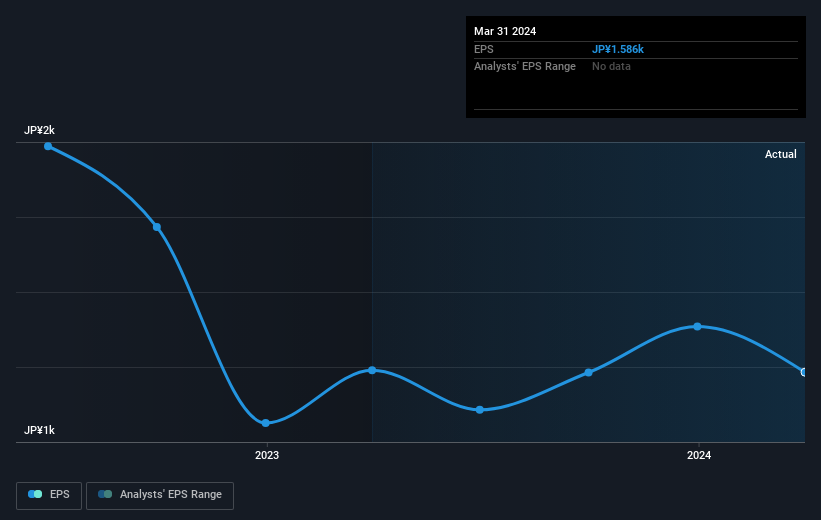- Japan
- /
- Metals and Mining
- /
- TSE:5922
Nasu Denki-Tekko's (TSE:5922) earnings growth rate lags the 16% CAGR delivered to shareholders

It might be of some concern to shareholders to see the Nasu Denki-Tekko Co., Ltd. (TSE:5922) share price down 22% in the last month. Looking further back, the stock has generated good profits over five years. It has returned a market beating 92% in that time.
In light of the stock dropping 15% in the past week, we want to investigate the longer term story, and see if fundamentals have been the driver of the company's positive five-year return.
Check out our latest analysis for Nasu Denki-Tekko
To quote Buffett, 'Ships will sail around the world but the Flat Earth Society will flourish. There will continue to be wide discrepancies between price and value in the marketplace...' One flawed but reasonable way to assess how sentiment around a company has changed is to compare the earnings per share (EPS) with the share price.
Over half a decade, Nasu Denki-Tekko managed to grow its earnings per share at 14% a year. This EPS growth is remarkably close to the 14% average annual increase in the share price. This indicates that investor sentiment towards the company has not changed a great deal. In fact, the share price seems to largely reflect the EPS growth.
The image below shows how EPS has tracked over time (if you click on the image you can see greater detail).

This free interactive report on Nasu Denki-Tekko's earnings, revenue and cash flow is a great place to start, if you want to investigate the stock further.
What About Dividends?
It is important to consider the total shareholder return, as well as the share price return, for any given stock. The TSR is a return calculation that accounts for the value of cash dividends (assuming that any dividend received was reinvested) and the calculated value of any discounted capital raisings and spin-offs. So for companies that pay a generous dividend, the TSR is often a lot higher than the share price return. In the case of Nasu Denki-Tekko, it has a TSR of 114% for the last 5 years. That exceeds its share price return that we previously mentioned. The dividends paid by the company have thusly boosted the total shareholder return.
A Different Perspective
We're pleased to report that Nasu Denki-Tekko shareholders have received a total shareholder return of 3.2% over one year. That's including the dividend. However, the TSR over five years, coming in at 16% per year, is even more impressive. The pessimistic view would be that be that the stock has its best days behind it, but on the other hand the price might simply be moderating while the business itself continues to execute. It's always interesting to track share price performance over the longer term. But to understand Nasu Denki-Tekko better, we need to consider many other factors. To that end, you should learn about the 4 warning signs we've spotted with Nasu Denki-Tekko (including 1 which is a bit concerning) .
But note: Nasu Denki-Tekko may not be the best stock to buy. So take a peek at this free list of interesting companies with past earnings growth (and further growth forecast).
Please note, the market returns quoted in this article reflect the market weighted average returns of stocks that currently trade on Japanese exchanges.
Valuation is complex, but we're here to simplify it.
Discover if Nasu Denki-Tekko might be undervalued or overvalued with our detailed analysis, featuring fair value estimates, potential risks, dividends, insider trades, and its financial condition.
Access Free AnalysisHave feedback on this article? Concerned about the content? Get in touch with us directly. Alternatively, email editorial-team (at) simplywallst.com.
This article by Simply Wall St is general in nature. We provide commentary based on historical data and analyst forecasts only using an unbiased methodology and our articles are not intended to be financial advice. It does not constitute a recommendation to buy or sell any stock, and does not take account of your objectives, or your financial situation. We aim to bring you long-term focused analysis driven by fundamental data. Note that our analysis may not factor in the latest price-sensitive company announcements or qualitative material. Simply Wall St has no position in any stocks mentioned.
Have feedback on this article? Concerned about the content? Get in touch with us directly. Alternatively, email editorial-team@simplywallst.com
About TSE:5922
Nasu Denki-Tekko
Manufactures and sells steel towers, steel structures, transportation system materials, overhead wire hardware products, and underground wire materials in Japan.
Flawless balance sheet average dividend payer.

